

Man undergoes emergency surgery to remove wireless ear bud he swallowed in his sleep. An American man is warning people against using headphones while falling asleep after health care workers had to perform an emergency operation to remove a wireless ear bud from his oesophagus.
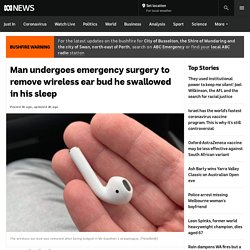
The man believes he accidentally ingested an ear bud while sleepingAn X-ray revealed it was lodged in his lower oesophagusHe had experienced minor discomfort and had trouble swallowing Brad Gauthier, from Worcester near Boston in Massachusetts, said he only discovered that he had swallowed the listening device when he realised it was missing the next day. Mr Gauthier detailed his bizarre experience in a Facebook post.
Dan Kwartler: What causes insomnia? Matt Walker: Sleep is your superpower. Climate grief expected to be widespread soon but it's still not openly acknowledged - ABC News. Sleep-deprived Australian teenagers struggling, study finds. Posted about 3 hours agoMon 2 Dec 2019, 8:17pm Mobile phones and energy drinks are keeping teenagers awake at night, with a new study revealing a majority of senior school students are sleep-deprived.
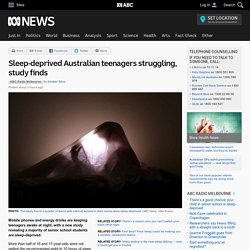
Key points: A lack of sleep is linked to conditions like anxiety and depressionTeenagers are struggling to meet sleep guidelines during school termsSome experts are calling for later school hours More than half of 16 and 17-year-olds were not getting the recommended eight to 10 hours of sleep on school nights, with researchers confirming links between a lack of shut-eye and anxiety and depression. The research, published by the Australian Institute of Family Studies, is the first detailed analysis of Australian students' sleeping habits.
About 10,000 children and their families were surveyed around the country between 2010 and 2016. Are you getting the recommended amount of sleep? Figures from the Sleep Health Foundation. Should school be pushed back for sleepy teenagers? Sleep deprivation is turning us into zombies, Queensland researcher warns. Updated about an hour agoSun 17 Mar 2019, 10:41pm Prolonged lack of sleep is turning many of us into zombies and the global phenomenon is tipping people further toward irrational and imbalanced behaviour, a Brisbane sleep researcher is warning.
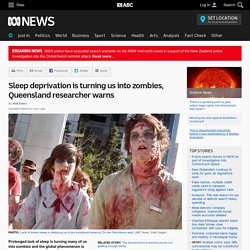
Key points: Behaviour in many societies is increasingly unbalanced due to prolonged sleep deprivation, Dr van Swinderen saidREM or dream sleep is essential for our brains to function normally, but researchers don't yet fully know whyShift work, screen exposure and lifestyles are the main culprits and sleeping tablets and anti-depressants make matters worse Queensland Brain Institute evolutionary biologist Dr Bruno van Swinderen said most people felt they were not getting enough sleep, owing to stress, work hours, light exposure and other lifestyle factors.
Early birds have lower risk of mental illness than night owls, genes show - Science News - ABC News. Some people jump out of bed at the crack of dawn, while for others, early morning is only something experienced if they've stayed up the night before.
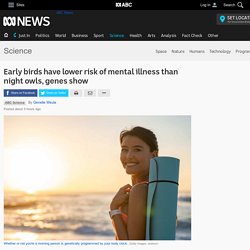
Key points Study of nearly 700,000 people found 324 new genes associated with the body clockHaving more 'early rising' genes meant people were more likely to report a sense of wellbeing and less likely to be at risk of developing a mental illness Understanding how the body clock influences health could lead to more targeted treatments for mental illnesses But night owls take note: people who are genetically programmed to be early risers have a lower risk of schizophrenia or depression, according to a large new study. "We show that being a morning person is causally associated with better mental health," an international team of researchers reported today in Nature Communications.
Science catches up on the reasons for sleep paralysis and it's all to do with the brain. Posted about 3 hours agoSat 26 Jan 2019, 8:15pm The sensation of an evil presence lurking in your room, a crushing pressure on your chest, an out of body experience and a complete inability to move.
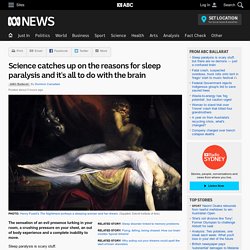
Sleep paralysis is scary stuff. Documented since the 7th century and often attributed to the paranormal or dismissed as just a bad dream, the phenomenon remains something of a scientific curiosity. Yet researchers from the Harvard Medical School in the United States have made significant inroads into explaining the disruptive sleeping pattern, which they estimate can affect up to 30 per cent of the population. As it turns out, you're not insane and you're not being harassed by demons. Obstructive sleep apnoea the cause of loud snoring in 50 per cent of cases, expert says. How Marina Benjamin stopped seeing her insomnia as a curse - RN.
Posted about 4 hours agoFri 11 Jan 2019, 8:00pm "It's like falling in love, it's like your mind is on fire.
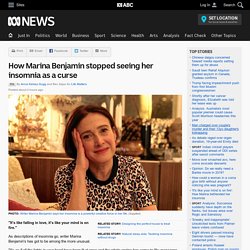
" As descriptions of insomnia go, writer Marina Benjamin's has got to be among the more unusual. "It's as if all the lights in your head have been lit at once and the whole engine has come to life; messages flying, dendrites flowering, synapses whipping snaps of electricity. " Benjamin, who is in her 50s, has had insomnia for almost all of her life — and until recently she considered it a curse. But when she began writing her memoir, Insomnia, her relationship with the condition suddenly changed. Now, she embraces it as a companion, rather than an adversary — and she wants fellow insomniacs to do the same.